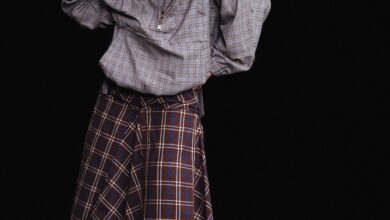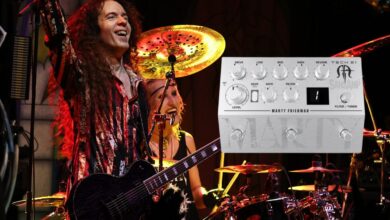Tone Talk with Amber Russell: “I think strings are a huge part of tone.”

Hi, my name is Amber Russell; I grew up in Elkhart, Indiana — the RV capital of the world, where I built RVs (obviously). I had played guitar for fun since I was a child but never had any actual guitar lessons. After many years of working in the trailer factories, I decided I wanted to leave the Midwest and see what other parts of the world had to offer.
When I was 25, I moved to Los Angeles and worked odd jobs (cleaning houses, PA work, painting, etc.). I had a duo folk group called Seropolar with my pal Steve, and we gigged often. I was living from one couch to the next (that does not mean rent was free) throughout the West Coast.
I had discovered Andy Mckee years ago and thought, “I could never play like that; why try?” So one day, I did try, and I tried every day for three months and finally learned his song “Drifting.” A wave of something special came over me during that time. I felt free playing in open tunings without the constraints of standard playing, needing to know all of my chords, and feeling like I could never be a great guitar player because I didn’t know the language of music (I still don’t. Let’s just blame ADHD). I liked that no one knew how to play in the tunings I was playing in, and it felt like I was making a language of my own.
After that, I never played another song in standard tuning again. I made fingerstyle guitar friends around the world through Instagram (TikTok didn’t exist) and strengthened my guitar community. Everyone I met who played fingerstyle had this certain special something that felt like there were others like me. We are all instrumental solo guitarists who play completely different from one another, and we are all fans of each other’s music. That feels like the most magical community to me, and it has been a gift in my life ever since.
My friend Adrian called me one day and said he had roommates move out and asked if I wanted to move to Portland. I had never been, but I heard good things. Plus, I knew I would get to hang with another fingerstyle guitarist, and I could grow as a guitar player hanging with Adrian. He guided me on how to go busking and where and what to be aware of. Nine years later, I have built a beautiful life for myself since settling in Portland, Oregon. Some of my proudest and happiest moments over the last few years have been releasing my album Metanoia on Candyrat Records in 2019, co-founding my own music shop with my wife named Rose City Guitar Company in 2020, busking at the Portland Saturday Market, touring, and sharing the stage with legends like Yasmin Williams, Kaki King, and Muriel Anderson.
Admittedly, with the pandemic and the building of a new business from scratch, music had taken a backseat in recent years. Now that Rose City Guitar Company is flourishing, I’m turning my attention back to my biggest motivation — composing new music. With a fresh album in the works and performances on the horizon for 2025, I’m looking forward to rediscovering my love for fingerstyle and connecting with more people through music.

What is your definition of tone, and how has it changed over the years?
To me, I think tone starts with intention and ends with precision. I have a sound in my mind; now, I have to invent the movement and ingredients to execute that sound. Early on, my guitar playing was a lot of chords and strumming. I used lighter picks so I could strum faster, with less volume. Now that I play percussive fingerstyle, I do not use picks. I have acrylic nails on my right hand, which help with pinch harmonics, tapping, and strumming simultaneously, as well as adding texture to some of the percussive elements. Some players cannot play guitar without a pick; I cannot play without my nails. I don’t think I could go back even If I wanted to at this point. It’s so crucial to my playing now.
Which guitars, amps, and pedals are you currently using and why?
Honestly, I don’t currently use a whole lot of gear like pedals or special amps. For me, my guitar, strings, and my pickup system is what is important. I am lucky to have an incredible hand-crafted instrument built by Luthier Gage Halland. I don’t think it is important for a new guitar player to put too much effort towards an expensive instrument, but if it becomes your passion and you have spent a lot of time learning more about the sound you’re looking for, then you can save some money and treat yourself to a quality instrument.
I think the guitar you have has little to do with how talented you will be; it primarily helps with the sound of your recording and live performances. It’s like buying a brand-new car the day you get your license…. It may be a better idea to keep it cheap and simple until you know what you’re doing, and as for a guitar, if you even like to play.
My cutaway Halland guitar has a K&K Trinity Pro mini pickup system. It is a dual pickup system (a passive pickup and a microphone), and I love it! My SGI Avenir guitar comes with the SGI-NS3V natural sound system, which is similar to the K&K but puts out a bit more sound and has volume control. With these pickup systems, I am able to have management between the two channels with my pre-amp to adjust how much of the percussion is heard and separating the areas where different tones are present.
Why do I prefer these pickup systems?
- A passive pickup means NO 9V BATTERIES! YAY! No one wants to have to change batteries before or during a performance.
- They pick up the percussive elements. When you buy a new guitar with a pickup system included, the system uses a magnet to capture the vibration from the strings, not the elements from the wood.
- The sound or tone of an acoustic guitar, in my opinion, is not only the strings, but the shape of the instrument. If you have a parlor guitar, the sound may sound a little tin-like or sharper, and a dreadnought has a large body and sounds deeper and bigger. The more holes in the guitar or appliances (like 9V batteries), the more they can affect or dampen the sound by absorbing the vibrations. My point is that acoustic guitars with stock pickup systems usually have a 2×2 inch square cut into the wood of the guitar to place a pickup system into it. With a passive pickup system, you only have to apply minor drilling where a guitar strap-button already exists.
What about strings?
I think strings are a huge part of tone. When I was a teenager, I experimented with different gauges and coatings, trying to figure out what made them different. I used to use phosphor bronze strings for their crisp attack and overtones, but over time, I started prioritizing warmth and balance. Now, and for the last 20 years, I have been using Elixir Strings 80/20 Bronze Nanoweb .13-.56, It’s a slightly heavier gauge, it gives a bassy/ fuller sound, and the coated strings are smooth to eliminate that “zippy” sound. Coated strings help with longevity. With other strings, I would have to change them every four to six weeks, while the Elixir Strings last months and can sustain the warmth and life of the strings. I have learned that different players have different acidity or PH levels in their sweat, so some people will play their guitar one time, and the strings will turn green… I’m dead serious; it’s a real thing (my old roommate). If your strings are turning green after one use, you may want to consider a coated string. I don’t know how to fix your PH levels, but this is a way to get more life out of the strings you use if you have this issue.
How do you keep your sound consistent onstage?
Consistency onstage starts with practicing my songs with a metronome, playing them correctly a trillion times, and knowing my gear inside and out. I make sure my guitar is set up properly, I have low action and fresh strings, and I like to have a proper soundcheck to dial in levels and make sure I can hear myself and I don’t have feedback. In my guitar case, there is always a string winder, capos, a tuner and extra tuner batteries, an extra set of Elixir Strings, and nail clippers. Being prepared comes in handy, but being unprepared… is embarrassing and could affect your performance (speaking from experience from that time I was doing an outdoor festival and my tuner died, so switching tunings was difficult since I always rely on a tuner).
My touch and technique are just as important —staying relaxed and in control helps keep my dynamics even. I also trust my hands more than the gear, no matter the setup. I stretch before and after playing, and it makes a world of difference. Most importantly, be in tune. If my guitar is out of tune, I don’t care how deep into a song I am, I will do my best to find a smooth way to adjust the out-of-tune string mid-performance. I don’t know if that’s the “professional” thing to do; I just know I will go crazy if I have to play a song I love and hear that one wrong note over and over. Even if the audience cannot hear the string being out of tune, my face will give it away.

What does your practice consist of?
I find that I practice in a more disciplined way when I have a lot of shows booked or I am actively on tour. To be honest, I tend to fall off the wagon if I don’t have many shows coming up, and I don’t put in the time as I do when I am on tour. I believe the only true practice for me is when I apply a metronome. It can be an annoying and frustrating thing to do if you are new to using a metronome. When I was younger and a singer-songwriter, I would complain that “the metronome is messing me up” when, in reality, I was getting off of tempo. I heard a saying once that has always stuck with me. “Practice doesn’t make perfect; perfect practice makes perfect.” Over time, we get so familiar with our own songs, and they become more comfortable and more dialed in. That being said, I think it is crucial to reintroduce the metronome if you want to get the best practice possible. If there is a section of the song you are playing wrong, you’ll do it the same wrong way every time. Applying a metronome amplifies your “errors” if you’re going for a crisp, natural talent feel. Watch a video of your favorite guitarist ever. I can assure you they practice with a metronome regularly. In my opinion, it’s the difference between good and great.
Favorite guitar riff or lick that inspired you to play guitar?
I feel like I have always had an affinity for music, and that includes all instruments, not just guitar, but one of the first songs I learned that made me really enjoy playing fingerstyle guitar was “Drifting” by Andy Mckee. The percussive groove and intricate fingerstyle technique opened my eyes to what was possible beyond standard strumming. I was also deeply inspired by Antoine Dufour’s “She is Music” — the way he blends melody, percussion, and harmonics felt like a whole band in one guitar. Also, it was my first time seeing someone use the “spider capo.” I love the creativity of percussive fingerstyle. Those kinds of pieces made me want to push the boundaries of what I could do with the instrument and explore fingerstyle as a main voice in my playing.
What is your advice for young women who hope to work in the music industry?
BUILD COMMUNITY. Commit to your vision, surround yourself with people who lift you up, and never wait for permission to take up space! The industry needs more women who are bold, determined, and ready to take on all the challenges ahead. Social media has become an important element for tapping into the industry, but don’t forget that, ultimately, your music is all that really matters. It’s not your image or how many likes you get. If you decide to be vulnerable and post your music online, you are likely to receive support from friends and family, as well as judgment and possibly cruelty from people who do not know you. DO NOT let them affect you. I think my most “viral” Instagram video got a lot of popularity because of a lot of the negative comments. I remember hate comments really got to me one day, and a friend of mine reminded me of a lyric by rapper Young M.A in her song “Brooklyn Poppin.” She says, “If you ain’t got no haters, you ain’t poppin.” It’s a real thing. If you receive negative comments from strangers on the internet, maybe you’ve made it. Stay focused on your sound and expression, prepare for sacrifice and challenges, but make sure you are still having fun.
Connect with Amber Russell on Instagram @amberrussellmuzic



